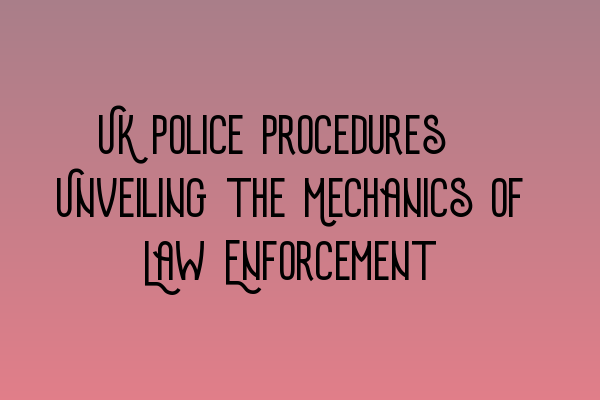UK Police Procedures: Unveiling the Mechanics of Law Enforcement
Welcome to SQE Criminal Law & Practice Law UK, where we provide comprehensive information about the legal field in the United Kingdom. In this blog post, we will dive into the intricacies of UK police procedures, shedding light on the mechanics of law enforcement. Whether you’re an aspiring solicitor, a law student preparing for the SQE exams, or simply interested in understanding how the UK justice system works, this article is for you.
Understanding the Basics of UK Police Procedures
Police procedures in the UK are governed by a combination of laws, regulations, and best practices designed to ensure fairness, efficiency, and accountability. These procedures serve as a framework for law enforcement agencies to carry out their duties effectively while respecting the rights of individuals involved.
The decision to initiate police action, such as making an arrest or conducting a search, is based on reasonable suspicion or probable cause. This means that police officers must have a justifiable reason to believe that a crime has been committed, is being committed, or is about to be committed. This requirement helps prevent arbitrary or unwarranted police interventions.
Once initiated, a police investigation involves various procedures aimed at gathering evidence, interviewing witnesses, and collecting information to establish the facts of a case. The process includes:
- Gathering evidence from the scene and preserving it for forensic examination.
- Interviewing witnesses and obtaining statements.
- Conducting searches with appropriate legal authorization.
- Arresting suspects based on valid grounds.
- Questioning suspects, ensuring their rights are protected.
The information gathered is crucial in building a case for prosecution. The police work closely with the Crown Prosecution Service (CPS), providing them with the evidence necessary to decide whether to pursue charges against a suspect. The decision to charge rests with the CPS, not the police.
Key Stages of the Criminal Justice Process
Understanding the key stages of the criminal justice process is essential for anyone involved or interested in UK police procedures. These stages include:
- Investigation: The police gather evidence and compile information about the alleged crime.
- Arrest: If there is sufficient evidence and reasonable grounds, the police can arrest a suspect.
- Interview: The suspect is questioned by the police, and their rights are explained to them.
- Charging Decision: The CPS reviews the evidence and decides whether to charge the suspect.
- Court Proceedings: If charged, the case goes to court, where the evidence is presented, and a verdict is reached.
- Sentencing: If convicted, the court determines the appropriate punishment based on relevant laws and guidelines.
- Appeal: The convicted individual may have the right to appeal the verdict and/or the sentence.
It’s important to note that while these stages provide a general overview, each case can have its own unique complexities and variations.
Preparing for the SQE Exams with SQE Criminal Law & Practice Law UK
If you’re preparing for the SQE exams, SQE Criminal Law & Practice Law UK offers comprehensive preparation courses to help you succeed. Our SQE 1 and SQE 2 preparation courses are designed to equip you with the knowledge and skills necessary to excel in these exams. We also provide practice exam questions and mocks to enhance your understanding and test your progress.
For more information on SQE 1 practice exam questions and SQE 1 practice mocks, click here.
To explore our SQE 2 preparation courses, click here.
Stay Updated with SRA SQE Exam Dates
Keeping track of SRA SQE exam dates is crucial for aspiring solicitors. To stay updated with the latest exam dates, deadlines, and important information, visit our article on SRA SQE Exam Dates.
We hope this blog post has provided valuable insights into UK police procedures and their role in the criminal justice system. Should you require any legal assistance or further information, please feel free to reach out to us at SQE Criminal Law & Practice Law UK. We are here to support you on your legal journey.
